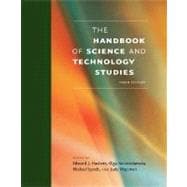
Note: Supplemental materials are not guaranteed with Rental or Used book purchases.
Purchase Benefits
What is included with this book?
| Preface | p. xi |
| Acknowledgments | p. xiii |
| Introduction | p. 1 |
| Ideas and Perspectives | p. 9 |
| Science and Technology Studies and an Engaged Program | p. 13 |
| The Social Study of Science before Kuhn | p. 33 |
| Political Theory in Science and Technology Studies | p. 63 |
| A Textbook Case Revisited-Knowledge as a Mode of Existence | p. 83 |
| The Social Worlds Framework | p. 113 |
| A Theory/Methods Package | |
| Feminist STS and the Sciences of the Artificial | p. 139 |
| Technological Determinism Is Dead | |
| Long Live Technological Determinism | p. 165 |
| Pramoedya's Chickens | p. 181 |
| Postcolonial Studies of Technoscience | |
| Practices, People, and Places | p. 205 |
| Argumentation in Science | p. 211 |
| The Cross-Fertilization of Argumentation Theory and Science Studies | |
| STS and Social Epistemology of Science | p. 241 |
| Cognitive Studies of Science | p. 259 |
| Give Me a Laboratory and I Will Raise a Discipline | p. 279 |
| The Past, Present, and Future Politics of Laboratory Studies in STS | |
| Social Studies of Scientific Imaging and Visualization | p. 297 |
| Messy Shapes of Knowledge-STS Explores Informatization, New Media, and Academic Work | p. 319 |
| The Virtual Knowledge Studio: | |
| Sites of Scientific Practice | p. 353 |
| The Enduring Importance of Place | |
| Scientific Training and the Creation of Scientific Knowledge | p. 377 |
| The Coming Gender Revolution in Science | p. 403 |
| Politics and Publics | p. 429 |
| Science in the Modern World | p. 433 |
| Science and Public Participation | p. 449 |
| Science, Technology, and Social Movements | p. 473 |
| Patient Groups and Health Movements | p. 499 |
| User-Technology Relationships | p. 541 |
| Some Recent Developments | |
| STS and Ethics | p. 567 |
| Implications for Engineering Ethics | |
| STS Perspectives on Scientific Governance | p. 583 |
| Expertise | p. 609 |
| From Attribute to Attribution and Back Again? | |
| Institutions and Economics | p. 631 |
| The Commercialization of Science and the Response of STS | p. 635 |
| Organizational Contexts of Science | p. 691 |
| Boundaries and Relationships between University and Industry | |
| Science, Technology, and the Military | p. 719 |
| Priorities, Preoccupations, and Possibilities | |
| The Right Patient for the Drug | p. 741 |
| Pharmaceutical Circuits and the Codification of Illness | |
| Making Order | p. 761 |
| Law and Science in Action | |
| Knowledge and Development | p. 787 |
| Emergent Technosciences | p. 813 |
| Genomics, STS, and the Making of Sociotechnical Futures | p. 817 |
| Emerging Medical Technologies | p. 841 |
| Biomedical Technologies, Cultural Horizons, and Contested Boundaries | p. 875 |
| STS and Social Studies of Finance | p. 901 |
| Nature and the Environment in Science and Technology Studies | p. 921 |
| Bridging STS and Communication Studies | p. 949 |
| Scholarship on Media and Information Technologies | |
| Anticipatory Governance of Nanotechnology | p. 979 |
| Foresight, Engagement, and Integration | |
| List of Contributors | p. 1001 |
| Name Index | p. 1015 |
| Subject Index | p. 1047 |
| Table of Contents provided by Publisher. All Rights Reserved. |
The New copy of this book will include any supplemental materials advertised. Please check the title of the book to determine if it should include any access cards, study guides, lab manuals, CDs, etc.
The Used, Rental and eBook copies of this book are not guaranteed to include any supplemental materials. Typically, only the book itself is included. This is true even if the title states it includes any access cards, study guides, lab manuals, CDs, etc.